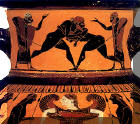THE ORGANISATION OF THE GAMES
The responsibility for the organisation and conduct of the Olympic Games lay with the Eleians.
The senior officials of the games were called Hellanodikai. Initially there was just one such official, called diaitater (referee), and the office was hereditary and held for life. By the time the program of events was finally settled in 348 BC (108th Olympiad), there were ten Hellanodikai who were elected for a single Olympiad.
The task of the Hellanodikai was to organize and hold the games, to ensure that everyone strictly observed the rules, to supervise the events, to award the prizes, and to punish any form of infringement by inflicting fines or corporal punishment. The most common infringements were late arrival by the athletes, ignoring the instructions given by the responsible officials, breaking the rules of the events, and bribing athletes. In the last case, the athletes were not only disqualified but fined a sum of money, part of which was expended on the manufacture of bronze statues of Zeus, known as Zanes (the plural of Zeus)
The rules and regulations of the games and individual events were formulated gradually. From the 6th c. they were codified and written on stone stelai that were erected in the Agora of Elis and the sanctuary at Olympia.

